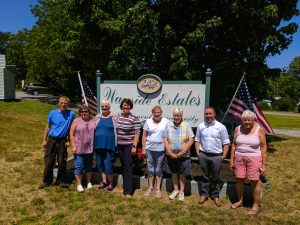By Jason Brady, NEROC Cooperative Development Specialist
Resident owned communities (ROCs) face internal and external challenges to maintaining affordable housing for their members. When these challenges are political it can take ROC leaders into new territory. To better advocate for their interests, ROC leaders are getting proactive by talking with and building relationships with local and state decision makers.
Here are a few stories of what communities in Massachusetts have been doing this summer.
Wayside

When the Wayside Community Association started to repair and upgrade their infrastructure they discovered the issues were more extensive and expensive than hoped. Faced with the all too common dilemma of paying for expensive repairs while maintaining affordable lot fees, the board of directors researched their options. As an organization that supports affordable housing, they were unsure if state and federal funding was available to support their mission.
Since work on a major electrical upgrade was wrapping up they thought it would be a good time to reach out to their local decision makers and invite them to tour their community and ask them what options are out there for resident owned manufactured housing communities. MA State Representative Jennifer Benson and Town of Shirley Selectman Bryan Sawyer accepted their invitation. They were introduced to resident ownership and how investments in Wayside are improving the quality of housing for this 55+ community. But unfortunately, there was still more work to do.
This was the first time that the members of the board of directors had been involved with this type of advocacy. They did a great job as ambassadors of their community and made a great impression. The conversation was started and now the board of directors has allies in their effort to identify funding opportunities to assist in upgrading and improving the community.
Edgeway
The members of the Edgeway Homeowners Association celebrated a major milestone in May. After eight years the court ordered infrastructure improvements they advocated for as tenants were completed. A fight that started over black water flowing from their faucets transformed the residents from tenants to advocates to resident owners. When they first raised their concerns the owner, Town of Middleboro, and the MA Department of Environmental Protection (MA DEP) were dismissive. So they started organizing to make their voices heard. Through grassroots action, the residents convinced the selectmen and MA DEP to step in.
After major investments in their water infrastructure, they can turn on the faucet and have clear water. The last project to be completed was the paving of the roads and sidewalks. When the paving company finished, the community threw a party and invited the folks that supported them through their ordeal.
Attorney Adam Bond, Selectman Allin Frawley, Selectwoman Leilani Dalpe and former Selectman Stephen McKinnon attended and complimented them on their hard work and perseverance. It was a great way to celebrate what they accomplished and a reminder of how a group of manufactured home park residents working together can make their community better.
Oak Hill
In the summer of 2017 the Oak Hill Taunton Residents Association (OHTRA) learned that the City of Taunton was implementing mandatory recycling with new 94 gallon barrels for manufactured home communities, condos, and apartment buildings. This new program would cost OHTRA $45 per lot per year on top of the property taxes. The board knew they had to act quickly because of the immediate impact on lot fees and having to answer complaints about the unintended consequences of the program, such as residents struggling to move the bigger bins and finding space to store them.
The first step OHTRA took was to speak with their sister community and fellow ROC, Colonial Estates. After some conversation, they decided to reach out to the City Council and inquire about the new fee. Unfortunately, City Hall did not have many answers, so they decided to get “political” and joined forces to advocate for their communities. They started with organizing calls to the city councilors and collecting petition signatures. Their actions caught the attention of the City Council, who have since postponed the fee.
To keep up the pressure they invited Councilman John McCaul to an ice cream social in July. It was well attended and a great opportunity for residents to speak with their councilman about the recycling situation and other local government concerns. It went so well that they are planning another one for the Fall. The board never imagined they would be engaging in this type of advocacy for their community, but every day is a new adventure when you are looking out for the best interest of your members and your community.
Democracy at work
A foundational principle of resident owned communities is democratic ownership. This is a powerful and empowering element of resident ownership, especially for residents who have felt ignored by politics at large. As ROC members they have learned and practiced democratic principles that have been important to their engagement with their local and state governments. Now as owners they are harnessing their voices, on their own terms, and demonstrating what can be achieved together.
